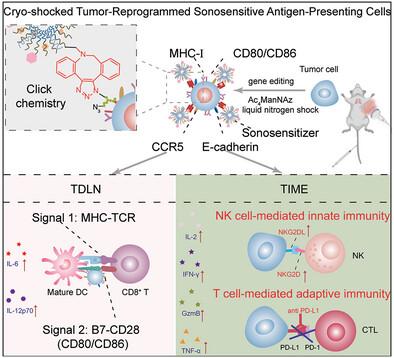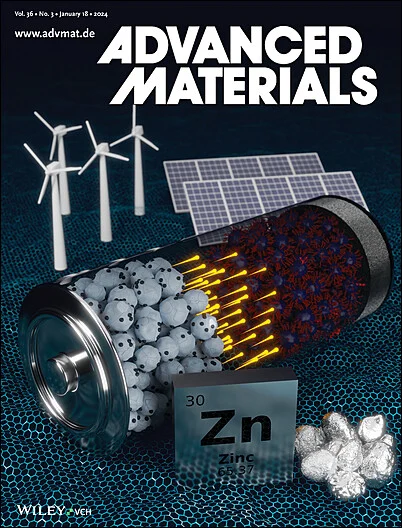Cryo-Shocked Tumor-Reprogrammed Sonosensitive Antigen-Presenting Cells Improving Sonoimmunotherapy via T Cells and NK Cells Immunity
IF 27.4
1区 材料科学
Q1 CHEMISTRY, MULTIDISCIPLINARY
引用次数: 0
Abstract
Ultrasound therapy has turned up as a noninvasive multifunctional tool for cancer immunotherapy. However, the insufficient co-stimulating molecules and loss of peptide-major histocompatibility complex I (MHC-I) expression on tumor cells lead to poor therapy of sonoimmunotherapies. Herein, this work develops a sonosensitive system to augment MHC-I unrestricted natural killer (NK) cell-mediated innate immunity and T cell-mediated adaptive immunity by leveraging antigen presentation cell (APC)-like tumor cells. Genetically engineered tumor cells featuring sufficient co-stimulating molecules are cryo-shocked and conjugated with a sonosensitizer, hematoporphyrin monomethyl ether, using click chemistry. These cells (DPNLs) exhibit characteristics of tumor and draining lymph node homing. Under ultrasound, NK cell-mediated innate immunity within the tumor microenvironment could be activated, and T cells in the tumor-draining lymph nodes (TDLNs) are stimulated through co-stimulatory molecules. In combination with programmed cell death ligand 1 (PD-L1) antibody, DPNLs extend the survival time and inhibited lung metastasis in triple-negative breast cancer (TNBC) models. This study provides an alternative approach for sonoimmunotherapy with precise sonosensitizer delivery and enhanced NK cell and T cell activation.

超声波疗法已成为癌症免疫疗法的一种非侵入性多功能工具。然而,辅助刺激分子的不足和肿瘤细胞上多肽-主要组织相容性复合体 I(MHC-I)表达的缺失导致超声免疫疗法的治疗效果不佳。在此,这项研究开发了一种声敏感系统,通过利用抗原呈递细胞(APC)样肿瘤细胞,增强 MHC-I 不受限制的自然杀伤细胞(NK)介导的先天性免疫和 T 细胞介导的适应性免疫。基因工程肿瘤细胞具有足够的协同刺激分子,经低温震荡后,利用点击化学方法与一种声敏剂--血卟啉单甲醚--共轭。这些细胞(DPNLs)表现出肿瘤和引流淋巴结归巢的特征。在超声波作用下,肿瘤微环境中由 NK 细胞介导的先天性免疫可被激活,而肿瘤引流淋巴结(TDLNs)中的 T 细胞则会通过共刺激分子受到刺激。DPNLs与程序性细胞死亡配体1(PD-L1)抗体结合使用,可延长三阴性乳腺癌(TNBC)模型的生存时间并抑制肺转移。这项研究为声波免疫疗法提供了另一种方法,即精确传递声波增敏剂并增强 NK 细胞和 T 细胞的活化。
本文章由计算机程序翻译,如有差异,请以英文原文为准。
求助全文
约1分钟内获得全文
求助全文
来源期刊

Advanced Materials
工程技术-材料科学:综合
CiteScore
43.00
自引率
4.10%
发文量
2182
审稿时长
2 months
期刊介绍:
Advanced Materials, one of the world's most prestigious journals and the foundation of the Advanced portfolio, is the home of choice for best-in-class materials science for more than 30 years. Following this fast-growing and interdisciplinary field, we are considering and publishing the most important discoveries on any and all materials from materials scientists, chemists, physicists, engineers as well as health and life scientists and bringing you the latest results and trends in modern materials-related research every week.
 求助内容:
求助内容: 应助结果提醒方式:
应助结果提醒方式:


